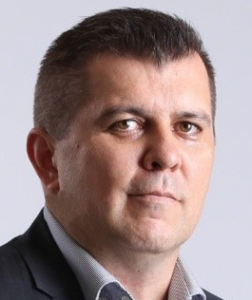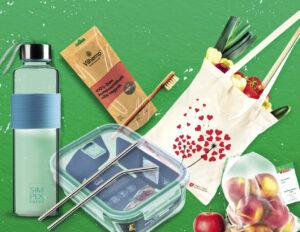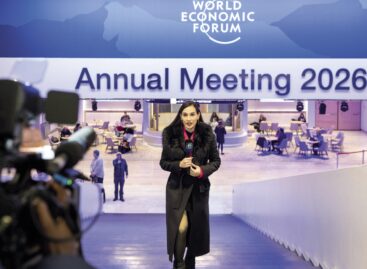Sustainability and innovation in packaging
This article is available for reading in Trade magazin 2024/8-9
Since the launch of the waste concession, MOHU has taken a number of measures to increase the proportion of separately collected and recycled waste, and to improve the efficiency and quality of collection and sorting.

Tivadar Runtág
chief operating officer
MOHU
“The results are already visible in such a short period of time, as we have achieved a quantitative increase in the separate collection and recycling of most types of waste. The landfill rate has dropped below 50% and the recycling rate has increased to 34%”,
says Tivadar Runtág, chief operating officer of MOHU.
He also tells that hundreds of billions of forints will be invested in the development of domestic waste management in the first 10 years of the concession. In addition to the beverage container return system, MOHU has standardised and made more accessible the operation of residential waste yards after the concession’s start, so that from July 2023 all Hungarian residents will be able to use the services of any of these upon presenting their address card. The COO believes Hungary is now closer to the desired 90% beverage packaging return rate with the REpont system introduced by MOHU. He also points out that more than 80 vans are being deployed to provide an efficient way for shops operating as manual return points in smaller municipalities to return single-use beverage containers.
Supporting the change
Miklós Nagy, technical secretary of the National Association of Packaging and Materials Handling (CSAOSZ) points out that packaging is of crucial importance from a sustainability perspective, but upstream processes in the value chain have a much greater impact on the environment. “

Miklós Nagy
technical secretary
CSAOSZ
Let’s not forget that the environmental impact of any product – water, energy, transport – is significantly greater than that of packaging. Packaging isn’t the problem, it is the solution, but while energy waste is invisible, packaging waste is visible”,
says Miklós Nagy.
The sector is facing big challenges, because although expectations in this area aren’t yet clear and the legislative environment – EU regulation – is changing, customers already want ready-made solutions from manufacturers. CSAOSZ now organises two conferences a year, the main goal of which is to offer an interpretative presentation of new knowledge, legislation and the expectations that they create. The situation isn’t easy for workers at companies involved in packaging, especially small and medium-sized enterprises which have to rely on themselves to study the new requirements. CSAOSZ programmes can help them by organising trainings and courses on specific topics.
Transport going greener
DHL Group aims to achieve net zero emissions by 2050, which would mean reducing greenhouse gas emissions to zero.

László Bory
head of sales and marketing
DHL Express Magyarország
“DHL Group’s ESG strategy has 4 pillars: green operations, great employer, reliable company and long-term impact. DHL is integrating sustainability goals into its global logistics network through its GoGreen initiative”,
explains László Bory, head of sales and marketing at DHL Express Magyarország.
DHL Group’s future goals include reducing all logistics-related emissions to net zero by 2050. The plan is to achieve this through the continued operation of electric vehicles, renewable energy use and the development of responsible logistics solutions. The company’s GoGreen Plus service – which is based on the use of sustainable jet fuel – makes its air transport carbon-neutral, so companies are able to reduce their CO2 emissions by 30% on average. DHL Express Magyarország is in line with global targets: the delivery fleet in Budapest is equipped with electric vans and bicycles, the Budapest site uses 100% green electricity, and all of their boxes are 100% recyclable.
Alternative solutions

Gyula Mazan
innovation manager
Smurfit Westrock
Smurfit Westrock Group has developed a global sustainability initiative called Better Planet Packaging, which proposes to replace most currently unsustainable packaging solutions with environmentally friendly versions.
“Smurfit Westrock Group has invented and patented a number of solutions that help to protect nature. Aqua Stop is a special paper that is more water-resistant than conventional papers, so it can withstand high humidity conditions, even outdoors. Agro Life paper is good for the ripening of fruits and vegetables. With this paper, we can help to extend the shelf life of produce in stores and minimise food waste”,
explains Gyula Mazan, innovation manager of Smurfit Westrock.
Smurfit Westrock Group seeks to achieve at least net zero emissions in all areas and across all businesses by 2050. //
Smurfit Westrock debuts in New York and London
Following the closing of the merger of Smurfit Kappa and WestRock on 5 July, the group was listed on the New York Stock Exchange on 5 July 2024 under the code “SW2”. The company is also listed on the London Stock Exchange with the code “SWR”. “The merger of Smurfit Kappa and WestRock has created the world’s leading sustainable packaging player”, said Tony Smurfit, CEO of Smurfit Westrock. “Both Smurfit Kappa and WestRock shareholders overwhelmingly supported the merger”, added Smurfit Westrock CFO Ken Bowles. //
Plastic-free month at SPAR
SPAR Magyarország has chosen Plastic Free July to call attention to the importance of reducing plastic waste.

The month-long initiative seeks to raise shopper and employee (SPAR has more than 14,000 workers) awareness of sustainability. SPAR shares useful information and tips on various platforms, including the company’s YouTube page, Instagram and SPAR stores. Highlights include the animated series ECO ADVENTURE, aimed at preschoolers and young schoolchildren, and the online publication “Plan Smart!”. //
Related news
Davos 2026: the risk premium has appeared on store shelves
🎧 Hallgasd a cikket: Lejátszás Szünet Folytatás Leállítás Nyelv: Auto…
Read more >Related news
Nestlé to sell remaining ice-cream assets but commits to Froneri venture
🎧 Hallgasd a cikket: Lejátszás Szünet Folytatás Leállítás Nyelv: Auto…
Read more >Lidl guarantees fairer prices for cocoa farmers
🎧 Hallgasd a cikket: Lejátszás Szünet Folytatás Leállítás Nyelv: Auto…
Read more >








